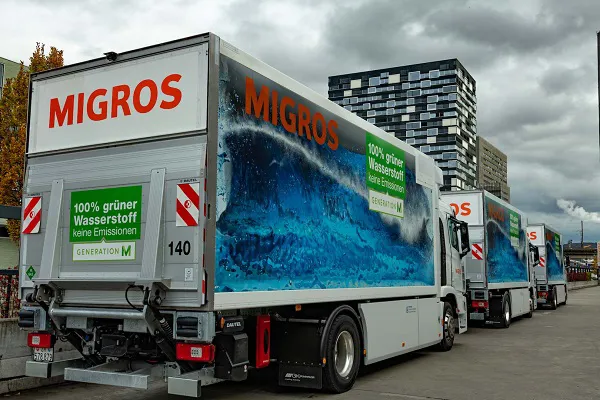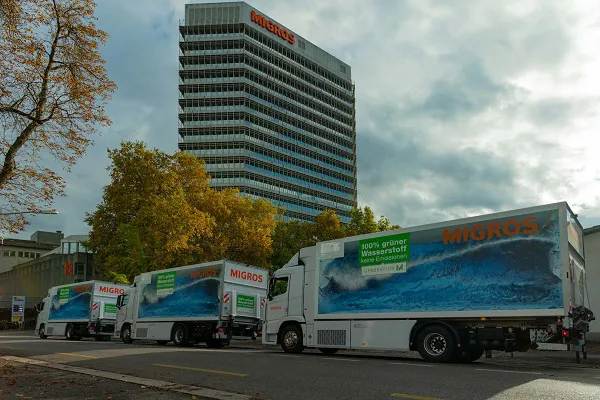Thanks to the "M Opex Tower" software -developed jointly with Empa- Migros can now map out its entire flow of goods in real time. This enables the retailer to make its logistics safer, more efficient and more ecological. The tool enables Migros to plan its transport logistics in such a way that it can reduce its CO2 emissions from road transport by 70% by 2030.
The "M Opex Towers" uses various data from Migros' transport routes. These include the distance of the trip, the differences in altitude on the route, the weight of the load and the fuel consumption. For this data, Migros and Empa (Swiss Federal Laboratories for Materials Testing and Research) have developed algorithms that can calculate which truck type is the most environmentally friendly for which route. Based on the results of the "M Opex Tower", Migros has derived a multi-technology approach. This means that it relies on a combination of three different alternative forms of propulsion and is continuously adapting its vehicle park accordingly.

Hydrogen
Just over a year ago, as one of the pioneers in Switzerland, Migros was one of the first companies to put Hyundai's Xcient Hydrogen Trucks into operation. Within a year, the hydrogen vehicle park has grown from 3 to 11. Three more trucks will soon join the Migros fleet. A major advantage of hydrogen trucks is their range. Today, they can be used for distances of up to 400 km.
Biogas
78 biogas and biodiesel trucks are already shipping goods for Migros in Switzerland. The Migros Basel cooperative reached a milestone at the beginning of November when it opened the first biogas filling station in Münchenstein (BL). Biogas produces up to 80% less CO2 emissions than diesel. The biogas closes a valuable cycle: among other things, it is obtained from green waste from various Migros operations.

Electric batteries
A total of 99 electric vehicles (13 trucks and 86 light vehicles) are currently driving on Swiss roads in the name of Migros. According to "M Opex Tower," electric trucks are ideal for short distances in the city. They are quiet and do not cause noise emissions during deliveries in residential areas.
Thanks to digitalization, Migros can consistently continue on its path of CO2 reduction and make freight transport as climate-friendly as possible. More purchases of ecologically sound transport trucks, as well as the expansion of the filling station network for alternative drives, are already being planned.
Rail still number one transport mode
Since its founding, Migros has always relied on rail transport, and even today around 50% of its internal transport is handled by rail. Migros' production plants are often directly connected to the national rail network and so a loaf of bread can be loaded onto a train and transported across Switzerland, almost straight from the oven. 400 SBB Cargo wagons are on the road every day for Migros alone.
For more information: www.migros.ch
